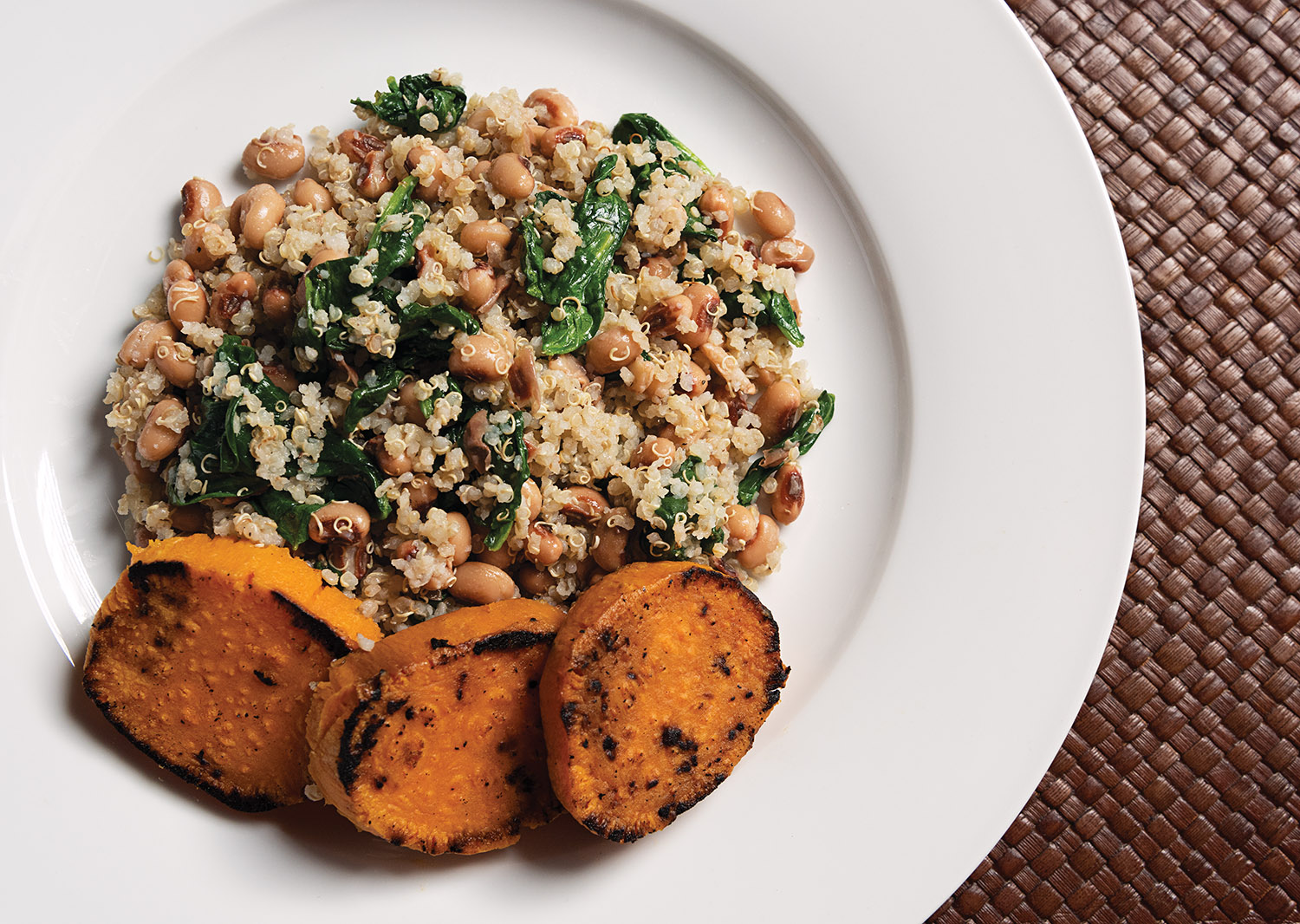A Kitchen of Many Flavors
Posted on June 29, 2018
The Morehead Foundry developed by Lee Comer ’97 links a variety of restaurants with a common kitchen in 30,000 square feet of space. (Photo by Jerry Wolford and Scott Muthersbaugh/Perfecta Visuals)
Lee Comer ’97 has built a restaurant empire — mostly under one roof.
The Morehead Foundry in Greensboro houses two catering companies, a private-event space, a burger joint, a bakery, an upscale Southern restaurant and a speakeasy. That doesn’t include Comer’s Iron Hen Cafe; the flagship restaurant that started it all is just a mile and a half away.
Morehead Foundry restaurants share a common kitchen and, with Iron Hen, a common goal. All have signs on the kitchen doors leading to the dining rooms for the entire 213-person staff to see: “Go Out and Make Somebody’s Day.”
“All of my employees are hired as ‘day makers,’ ” Comer said, often helping customers celebrate milestones: a couple ordering the macaroni and cheese at Iron Hen Cafe for their baby’s first taste of solid food or a woman marking the end of her chemotherapy with a reward at Revolution Burger.
Comer understands how restaurants can connect people: When she came to Carolina and her twin sister, Sandy, went to UNC-Greensboro, it was the first time they had been apart. So they got jobs waiting tables at the same steakhouse on weekends and talked about one day opening their own restaurant.
But there would be a couple of detours.
The day after graduating, with a double major in political science and communication studies, Comer moved to Atlanta and began working in restaurants, planning to take a year off before starting law school at Emory University.
That plan got sidetracked by her entrepreneurial instincts. Comer saw opportunity in Atlanta’s booming housing market and started a construction business doing cleanup and finishing work for tract houses. The builders were operating in Georgia and North Carolina, so eventually she was able to move back to be closer to her sister after their grandparents, who had raised them, both died. By 2008, when the housing market slumped, she was in Greensboro.
Despite never having managed a restaurant, Comer relied on her business experience to pivot away from construction and open Iron Hen Cafe in 2010. Serving local, sustainably grown food, it took off. And although Comer never planned to go into catering, after agreeing to do one wedding, that service soon outstripped the restaurant business.
When three years later the operation faced a grow-or-go-home turning point, the former builder found the 30,000-square-foot, almost-century-old building that had once housed Greensboro Iron Works. The building had a kitchen, which solved Comer’s immediate need for the catering operation. She saw potential in its location, near a greenway entrance and within walking distance of UNC-Greensboro. But it would require her to fill the space — no easy feat. “It was: You can give up or you can keep playing,” Comer said. With the move, she established the Fresh. Local. Good. food group as the umbrella for the expanding operation.
Comer opened the renovated iron works as The Morehead Foundry in 2016, taking inspiration from today’s sharing economy (think Uber, food courts and office co-working spaces): one kitchen shares equipment, food and supplies for multiple restaurants. The design means less food waste, increased cross-collaboration among staff and the scale to afford to offer retirement, health insurance, vacation and disability benefits to employees.
“By sharing, we can do more with less,” Comer said. “We can stretch.”
Comer’s not done stretching. This year, her company added a national meal-subscription service with a name inspired by her first restaurant: Hen in a Hurry.
— Andrea Weigl

Iron Hen Cafe’s whole grain hash. (Photo by Grant Halverson ’93)
Iron Hen Cafe’s Whole Grain Hash
From chef Zac VanGorder of Fresh. Local. Good. food group.
1 large sweet potato
2 tablespoons vegetable oil, divided
1 cup quinoa
3 cups water
1 15½-ounce can black-eyed peas,
rinsed and drained
2 cups spinach, stems removed
Salt and pepper
▶ Preheat oven to 425 F. Place scrubbed sweet potato, pricked with a fork, on a baking sheet in the oven and bake for 45 minutes or until a knife can be easily inserted in the center; you want it cooked but still firm. Remove from oven and let cool.
▶ Place 1 tablespoon of vegetable oil in a large skillet over medium-high heat. Add quinoa, stirring occasionally. The quinoa will start popping when it is done and smell nutty. Remove toasted quinoa from heat and add it to 3 cups of water in a saucepan. Bring to a boil and then remove from heat and let sit, covered, for 15 minutes.
▶ In the same skillet used to toast the quinoa, add 1 tablespoon of vegetable oil and bring back to medium-high heat. Add black-eyed peas and spinach and saute until greens are wilted. Add 1 cup cooked quinoa and stir to combine. Season to taste with salt and pepper.
▶ Peel sweet potatoes and slice into ½-inch- to ¾-inch-thick slices, ending up with 6 slices. Using a griddle or grill over high heat, reheat the sweet potatoes and caramelize the outside.
▶ Divide the peas-greens-quinoa hash between two plates and top each with three slices of sweet potato. The Iron Hen Cafe also tops the hash with grilled chicken, salmon or marinated tofu and serves it with half a deviled egg on the side.
Thanks for reading the Carolina Alumni Review
Carolina Alumni members, sign in to continue reading.
Not yet a member? Become one today.
